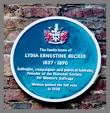Lydia Ernestine Becker 1827 – 1890
September 13, 2008
 Lydia
Ernestine Becker 1827
– 1890 was a leader in the early British
suffrage movement, as well as
an amateur scientist with interests in biology and astronomy. She is
best remembered for founding and publishing the Women’s Suffrage
Journal
between 1870 and 1890.
Lydia
Ernestine Becker 1827
– 1890 was a leader in the early British
suffrage movement, as well as
an amateur scientist with interests in biology and astronomy. She is
best remembered for founding and publishing the Women’s Suffrage
Journal
between 1870 and 1890.
In 1872, John Chapman published_ _The Political Disabilities of Women_ in __Westminster Review_.
From http://en.wikipedia.org/wiki/Lydia_Becker Born in the town of Chadderton to a German father and English mother, Lydia Ernestine Becker was educated at home, like many girls at the time.
Intellectually curious, she studied botany and astronomy, winning a gold medal for an 1862 scholarly paper on horticulture.Five years later, she founded the Ladies’ Literary Society in Manchester; she began a correspondence with Charles Darwin soon afterwards and convinced him to send a paper to the society.
In the autumn of 1866 Becker attended the annual meeting of the National Association for the Advancement of Social Science, where she was excited by a paper from Barbara Leigh Smith Bodichon entitled Reasons for the Enfranchisement of Women. She dedicated herself to organizing around the issue, and in January 1867 convened the first meeting of the Manchester Women’s Suffrage Committee. It was the first organization of its kind in England.
Several months later, a widow shop owner named Lily Maxwell mistakenly appeared on the register of voters in Manchester; Becker visited Maxwell and escorted her to the polling station. Once they arrived, the Returning Officer found Maxwell’s name on the list and allowed her to vote. Becker immediately began encouraging other women heads of households in the region to petition for their names to appear on the rolls. Their claims were presented in court by junior defence barrister Richard Marsden Pankhurst in Chorlton v. Lings, but the case was rapidly dismissed.
In 1870 Becker and her friend Jessie Boucherett founded the Women’s Suffrage Journal. Soon afterward, they began organising speaking tours of women – a rarity in Britain at the time. At an 1874 speaking event in Manchester organized by Becker, fifteen year old Emmeline Pankhurst experienced her first public gathering in the name of women’s suffrage.
The Women’s Suffrage Journal was the most popular publication relating to women’s suffrage in nineteenth century Britain. Roger Fulford, in his study of the movement Votes for Women: The Story of a Struggle, writes: “The history of the decades from 1860 to 1890—so far as women’s suffrage is concerned—is the history of Miss Becker.”
The Women’s Suffrage Journal published speeches from around the country, both within and outside of Parliament. Becker published her correspondence with both her supporters and opponents, notably in 1870, when she chastised the MP for Caernarvonshire after he voted against a proposal offering women the vote.
Becker differed from many early feminists in her disputation of essentialized femininity. Arguing that there was no natural difference between the intellect of men and women, Becker was a vocal advocate of a non gendered education system in Britain. She also differed with many suffrage activists in arguing more strenuously for the voting rights of unmarried women. Those women connected to husbands and stable sources of income, Becker believed, were less desperately in need of the vote than widows and single women. This attitude made her the target of frequent ridicule in newspaper commentary and editorial cartoons.
In 1890 Becker visited the spa town of Aix les Bains, where she fell ill and died. Rather than continue publishing in her absence, the staff of the Women’s Suffrage Journal decided to cease production. A final publication sent to subscribers included this note:
To all Readers. For twenty years and four months this [_Women's Suffrage Journal_](http://books.google.com/books?id=c0_JEBIPyysC&pg=PA67&dq=Women%27s+Suffrage+Journal&lr=&ei=B6DKSKG3J4X2iwG_ta36Cw&sig=ACfU3U3aglLXZpXgKPAvHj_JjRlYlphA8A) has received the impress of one hand and one mind, so that its long row of volumes forms one continuous work, and now when that careful hand is laid low and the energies of that far-seeing mind are carried beyond our mortal ken, it would seem the most fitting course to close these pages where Miss Becker left them.